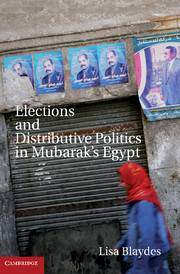Book contents
- Frontmatter
- Contents
- List of Figures
- List of Tables
- Acknowledgments
- 1 Introduction
- 2 Political and Economic Change since 1952
- 3 Elections and Elite Management
- 4 The Politics of Infrastructure Provision
- 5 Electoral Budget Cycles and Economic Opportunism
- 6 Vote Buying, Turnout, and Spoiled Ballots
- 7 Elections and Elite Corruption
- 8 Elections and the Muslim Brotherhood
- 9 Liberal Intellectuals and the Demand for Democratic Change
- 10 Foreign Pressure and Institutional Change
- 11 Egypt in Comparative Perspective
- 12 Conclusion
- Bibliography
- Index
9 - Liberal Intellectuals and the Demand for Democratic Change
Published online by Cambridge University Press: 04 February 2011
- Frontmatter
- Contents
- List of Figures
- List of Tables
- Acknowledgments
- 1 Introduction
- 2 Political and Economic Change since 1952
- 3 Elections and Elite Management
- 4 The Politics of Infrastructure Provision
- 5 Electoral Budget Cycles and Economic Opportunism
- 6 Vote Buying, Turnout, and Spoiled Ballots
- 7 Elections and Elite Corruption
- 8 Elections and the Muslim Brotherhood
- 9 Liberal Intellectuals and the Demand for Democratic Change
- 10 Foreign Pressure and Institutional Change
- 11 Egypt in Comparative Perspective
- 12 Conclusion
- Bibliography
- Index
Summary
A series of influential models argue that the reason the rich fear democratization is because democracy entails economic redistribution that favors the preferences of the median voter, who is likely to be poor (Meltzer and Richard 1981; Boix 2003; Acemoglu and Robinson 2006). Similarly, Ziblatt (2008) finds that the existence of an unequal distribution of immobile assets, such as land, is also a major impediment to democratization. Landowners and holders of capital are not, however, the only constituencies concerned about the preferences of the median voter. In Egypt, an additional dynamic is at play where democratic change not only impacts pecuniary redistributive stakes but also the distribution of civil rights and liberties, particularly for liberal intellectuals and artists. Intellectual and artistic elite – who have been key actors in democratic transitions around the world – are fearful of democracy because they believe that the cultural preferences of the median voter may limit their ability to pursue their creative work and livelihood. These fears become particularly heightened as a result of competitive multiparty elections in which the Muslim Brotherhood has enjoyed electoral success. Brotherhood electoral strength has an important demonstration effect, signaling the political prowess of the group to liberal intellectuals. By looking down the game tree, so to speak, intellectuals and artists may see a smaller payoff for democracy than their counterparts in Latin America, Eastern Europe, or East Asia.
- Type
- Chapter
- Information
- Elections and Distributive Politics in Mubarak’s Egypt , pp. 171 - 191Publisher: Cambridge University PressPrint publication year: 2010



